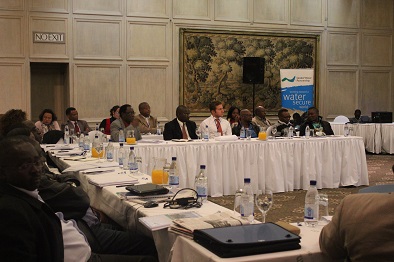The meeting was officially opened by the Director in the Ministry of Water Resources Management and Development (Zimbabwe), Mr. Gilbert Mawere. In his opening remarks, Mr. Mawere highlighted how IWRM aligns with national needs and is linked to national planning priorities and budget planning cycles. In line with this, Mr. Mawere emphasised how IWRM helps countries identify priorities for water use, and strategies for ensuring optimal resource utilization – especially where there are conflicting demands on limited resources and where social needs prevail. Mr. Mawere noted that the coming in of regional programmes such as the Water, Climate and Development Programme (WACDEP) has opened a window of opportunity for continued IWRM implementation in Zimbabwe. He further called upon all CWP chairs to work together with national governments in implementation of IWRM.
The meeting comprised four sessions:
The first session was a report back to Partners on the Governance, Strategic, Programmatic and Financial progress of the Partnership for 2011 and 2012. The CP elected 3 new SC members who will start their term only in 2014, but since there is no CP in 2014, CP endorsed the new SC members at the 2013 CP meeting.
The second session enabled participants to reflect on the work that the partnership has carried out in the region since 2009 - at all levels but especially Goal 4 - : “Building a more effective regional network”, on the CWPs. CWPs shared their programmatic and proposal activities in the last 2 years as well as updated CP on their governance/institutional status (including operational aspects). A facilitated discussion on strengthening CWPs and Partner involvement in programmes and feasible modalities of operation was debated.
The third session was dedicated towards engaging Partners and CWPs towards sharing GWPSA’s regional programmes and strategizing on partner’s engagements in the current and upcoming programmes that GWP SA and GWP in Africa have developed in partnership with SADC, Africa Network on Basin Organisations (ANBO), AMCOW, as well as GWPO, regional strategic allies and a couple of international private sector firms working in the region. Presentations were made on these projects and facilitated discussions were held with Partners to share the technical programmatic thrusts as well as engage them on implementation modalities and fund raising aspects for knowledge exchange and identifying possible opportunities for both Partner (individual institutions) and CWP engagement in these programmes.
The fourth session comprised seeking guidance and input from Partners to inform the regional work programme and 2014 Annual Work Plan. This session ensured that regional partners contribute to the formulation of GWPs new strategy (2014 – 2020). The draft regional discussion note that has was developed by the GWPSA Secretariat and informed by inputs from SC, RTEC and CWPs was used as the basis for discussion.
A number of outcomes were realised from the meeting. Among which included partners endorsement to GWPSA’s governance, developments and Constitutional amendments; and strengthened understanding on the regional programme and potential opportunities for engagement in GWPSA’s programmes with CWPs and Partner institutions. The programmes that were introduced to partners comprise the WACDEP, SADC-GIZ “Mainstreaming Climate Change into the SADC Water Sector’, Resilience in the Limpopo Basin; and the Climate Resilient Infrastructure Development Facility (CRIDF).
The CP as a whole encouraged Partners to reflect on the current (but ending) strategic period and implementation of the GWPSA 5 year Regional Strategic Business Plan (SBP 2009-2013) to chart a way forward together. In 2011, the CP 2011 meeting deliberations served as a ‘mid-term review’ of the implementation of the SBP and CP 2013 will consider key achievements, outcomes and lessons, to inform the new GWP strategy going forward into 2014. In 2009, the CP focused on definingstrategic implementation areas of the GWPSA Strategic Business Plan. GWPSA is keenly aware of the challenges that have faced CWPs and in this last year of implementing the Strategic Business Plan, much attention is being paid to Goal 4 aspects on CWPs. CP 2013 therefore dedicated a significant portion of the programme to interactive sessions with all Partners towards strategizing effectively on CWPs and sharing the regional programme and envisaged activities at local, national, basin and regional levels.
